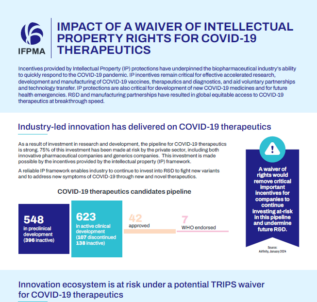IFPMA Statement on the G-FINDER Report “Landscape of Emerging Infectious Disease R&D: Preventing the Next Pandemic”
The latest G-Finder report “Landscape of Emerging Infectious Disease R&D: Preventing the next pandemic” shows that to be better prepared in the future, the R&D funding needs to be more diversified and supported by a wider range of funders. It also highlights the central role that product development partnerships (PDPs) and initiatives such as the Coalition for Epidemic Preparedness Innovations (CEPI), play to provide a coordination mechanism which pools funding from different organizations to advance research.
The report shows that overall funding for emerging infectious disease (EIDs) basic research and product development reached $886m in 2018, the highest total in the five years. The biopharmaceutical industry being the 3rd largest funder for R&D specifically targeting emerging infectious diseases (EIDs).
Today, R&D biopharmaceutical companies are working with partners to research and test potential COVID-19 treatments and vaccines. Thankfully, the industry is not starting from scratch, and we can benefit from experience and lessons from other previous health threats, such as Ebola, SARS, MERs, and Zika. But companies can also rely on the massive research investments and breakthroughs made in the past decades in other disease areas, such as research into broad spectrum antivirals and platform technologies, but also on experience and expertise with the seasonal influenza vaccines and adjuvants for example.
This shows the importance of having a rich and diversified innovation pipeline of treatments and vaccines, and to support cross-cutting R&D, including basic research, treatments, vaccines and diagnostics, that one day could be applicable to EIDs or as-yet-unidentified pathogens (Disease X).
Today, 22 leading IFPMA member companies are involved in R&D for COVID-19 therapeutics and together have enacted or are conducting 81 clinical trials evaluating therapeutics’ effectiveness. The main COVID-19 treatments being looked at are antivirals, antibodies and convalescent plasma, as well as anti-inflammatories. This is encouraging as the clinical response to help patients with COVID-19 requires multiple treatment options.There are also 201 candidate vaccines in development, including 8 in Phase III. Several approaches to COVID-19 vaccines are currently being tested, including traditional, tried-and-tested concepts, as well as novel approaches.
To overcome the coronavirus pandemic, vaccines may ultimately bring an end to the pandemic, but there is an urgent need for therapeutic innovation that can offer clinical benefits to COVID-19 patients. All treatments and vaccines that will be ultimately approved for COVID-19 will be the result of years of investments and innovation; and no matter how urgently action is needed against the coronavirus public health emergency, it is imperative that the highest standards of quality, safety and efficacy are upheld everywhere.
About IFPMA
The International Federation of Pharmaceutical Manufacturers and Associations (IFPMA) represents over 90 innovative pharmaceutical companies and associations around the world. Our industry’s almost three million employees discover, develop, and deliver medicines and vaccines that advance global health. Based in Geneva, IFPMA has official relations with the United Nations and contributes industry expertise to help the global health community improve the lives of people everywhere. For more information, visit ifpma.org.
Learn more




